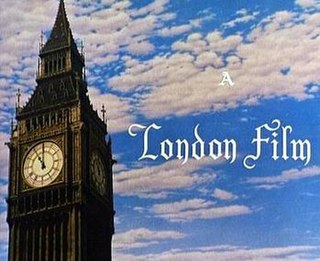Related Research Articles

London Films Productions is a British film and television production company founded in 1932 by Alexander Korda and from 1936 based at Denham Film Studios in Buckinghamshire, near London. The company's productions included The Private Life of Henry VIII (1933), Things to Come (1936), Rembrandt (1936), and The Four Feathers (1939). The facility at Denham was taken over in 1939 by Rank and merged with Pinewood to form D & P Studios. The outbreak of war necessitated that The Thief of Bagdad (1940) be completed in California, although Korda's handful of American-made films still displayed Big Ben as their opening corporate logo.

Frank Jenks was an acid-voiced American supporting actor of stage and films.
MGM-British was a subsidiary of Metro-Goldwyn-Mayer initially established at Denham Film Studios in 1936. It was in limbo during the Second World War; however, following the end of hostilities, a facility was acquired in Borehamwood, which remained in use until it was closed in 1970.
Kelville Ernest Irving was an English music director, conductor and composer, primarily remembered as a theatre musician in London between the wars, and for his key contributions to British film music as music director at Ealing Studios from the 1930s to the 1950s.

Jasper Joseph Inman Kane was an American film director, film producer, film editor and screenwriter. He is best known for his extensive directorship and focus on Western films.

Harry Lewis Woods was an American film actor.

Benny Bartlett was an American child actor, musician, and later a member of the longest running feature-film series The Bowery Boys.
Peter Gawthorne was an Anglo-Irish actor, probably best known for his roles in the films of Will Hay and other popular British comedians of the 1930s and 1940s. Gawthorne was one of Britain's most called-upon supporting actors during this period.
Walter Forde was a British actor, screenwriter and director. Born in Lambeth, south London in 1898, he directed over fifty films between 1919 from the silent era through to 1949 in the sound era. He died in Los Angeles, California in 1984.

Ivor Barnard was an English stage, radio and film actor. He was an original member of the Birmingham Repertory Theatre, where he was a notable Shylock and Caliban. He was the original Water Rat in the first London production of A. A. Milne's "Toad of Toad Hall". In 1929 he appeared on stage as Blanquet, in "Bird in Hand" at the Morosco Theatre in New York, after a successful run in London's West End. The part had been specially written for him by John Drinkwater.

Joseph A. Valentine (July 24, 1900 in New York City, as Giuseppe Valentino – May 18, 1949 in was an Italian-American cinematographer, five-time nominee for the Academy Award for Best Cinematography, and co-winner once in 1949.
George Heath was an Australian cinematographer best known for his collaboration with Ken G. Hall for whom he shot several features. According to one observer, he fitted into the Cinesound world far more than his predecessor, Frank Harley - "Heath adapted much more easily to studio work and soon developed into a technician of world class. His work on the features was always attuned to the demands of the film and its future audience: his images show few of the pretensions to grandeur which are to be found in the work of Hurley, and instead his photography is clear, expressive and undemanding."
Bryan Langley was a British cinematographer. Langley worked for a number of years with the British International Pictures organisation, but later worked at other studios including Gainsborough Pictures and Ealing. He was the son of opera singer and actor Herbert Langley.
Arne Åkermark (1902–1962) was a Swedish art director who worked on around a hundred and eighty films during a thirty-year career.
Norman G. Arnold was a British art director who designed the sets for over a hundred and twenty films.
Duncan Sutherland was a Scottish-born art director, based in England where he designed the sets for over eighty films and television series between the early 1930s and mid-1960s. Sutherland spent much of the 1940s employed by Ealing Studios where he worked on films such as It Always Rains on Sunday and The Loves of Joanna Godden.
Charles F. Royal (1880–1955) was an American screenwriter active primarily in the 1930 and 1940s. He worked on a number of western films for studios such as Columbia and Republic Pictures.
Lee Loeb (1910–1978) was an American screenwriter of film and television. He worked for several Hollywood studios including Columbia and Republic Pictures before going to work mainly in television production.
Fred Preble (1893–1953) was an American art director who designed the sets on well over a hundred film productions. He worked for a variety of production companies, including the studios Monogram and PRC.
Joseph O'Donnell (1891–1963) was an American screenwriter. He worked for a variety of studios on Poverty Row during the 1930s, mainly on westerns.
References
- ↑ Barr p.191